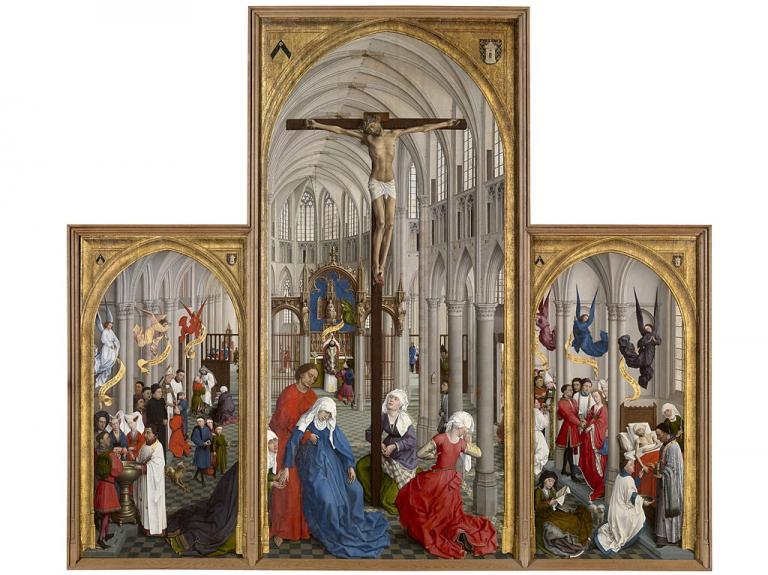
The Russian philosopher and historian, George Fedotov, at the beginning of his examination of the history of the “Russian Religious Mind,” informed his readers of a fact which should be obvious, and yet, for many, is not: the objective structures of a religious faith, like its doctrines or sacred rituals, represent only one aspect of religious faith. There is a subjective dimension to religious life which goes beyond such objective accounts and actions, a dimension which slowly influences the development of religious sensibilities so that through it, even the objective representations of religion can and do change:
In all religious societies – churches and sects – the objective structure of religion can but to a very small degree express or reflect the religious mind of contemporary man. It Is the heritage of a remote past, sacred and untouchable. It changes little, but it is the infinitesimal changes which bear witness to the deep religious processes going on. Spiritual life and ethics, despite their being rooted in tradition, move more freely than the objective elements and are in this respect similar to religious art. The degree of subjectivity of the different spheres of religious life determines their value as historical sources. The disparity between objective and subjective elements becomes tremendous in a Christian nation which confesses dogmas and practices, sacraments and rites inherited from an alien and long extinct civilization. [1]
Christianity is far more than its dogmas and rituals. Christianity should be a way of life. Its teachings help define the contours of that life, and that life would be nothing without the graces which Christian receive, but there remains the subjective dimension, an ever-changing dimension, which cannot be objectified. That dimension is fueled by grace and influenced by the objective teachings of the faith, but it is not limited by it, just as the truth itself cannot be confined by the words used to express it. Though doctrines and rituals are a necessary component of the Christian faith, they are really a secondary, conventional, and often reified, representation of the truth which lies beyond the human intellect. The Christian faith is a living faith when it accepts mystery, when it accepts that which cannot be contained by human reason, and yet paradoxically, to do this it must still accept the value of human reason and the need to satisfy reason’s limited functionality.
Faith should not contradict reason – though it can, and must – transcend it. How is this possible? Does not such transcendence indicate a contradiction by the fact that it denies the limits imposed by reason? But the point is that reason has limits, limits which reason itself can ascertain; within the confines of reason, the transcendent mysteries of faith can be investigated, discussed, and given conventional forms which can be said to be true (in contradiction to other statements which can and must be said to be false). The dogmas of the church are the primary postulates of the faith, while the doctrines are those elements which come from and are retrieved by reason and experience based upon the postulates which have been given. Such doctrines, moreover, because of their derivative nature, have less authority and hold over the truth: the more derivative they are, the less sustainable they become as they turn further and further away from the mysterious element of the truth which allows the truth to be absolute.
Not all Christians have the same knowledge of the faith, and so they do not always share the same set of beliefs, but this is not a problem. Christianity preaches and points to the truth, but it is not a knowledge-based religion where people are saved because of what they know. People are saved by grace and their reaction to that grace, to their fidelity to the grace which they have received. There is a need for those who are experts on the faith and its teachings, so that Christianity from generation to generation can keep pointing to and directing people towards the transcendent truth with an authenticity that answers the basic questions which people ask as they start their journey towards the absolute truth and its transcendence. But mere knowledge is not enough; faith hope, and love – not knowledge—are what grounds Christians with the Christian faith. Faith is not the same as knowledge or belief, though it requires one to accept and trust in the truth which has been revealed of the truth through Christ; hope is the hope that Christ’s work will do what is necessary to save – and deify – us; love is love for God as well as for all that God loves (which is, of course, a love for his creation, with a love which distinguishes God from his creation).
When we understand this, we can then begin to understand why, so long as Christians are not actively fighting against the truth of the Christian faith itself, they can hold a variety of opinions, some which can even be opinions that come close to opposition towards the truth of the faith itself. It is not because they willfully oppose the faith, which is where formal heresy lies, but because the transcendence of the faith and its dogmas have not been grasped by them. They still can be Christian, with a Christian faith, and yet find that faith mixed with all kinds of knowledge and beliefs from sources outside the Christian faith. Grace, combined with faith, hope and love, and an acknowledgment of the integral truth of the Christian faith as a whole, keeps them grounded and allows them to remain Christian even with whatever internal doubts or contradictory opinions they might hold. Historically, this seems to be the norm: before universal education and literacy, the average Christian would have a limited knowledge of the faith and a greater knowledge of folk wisdom, wisdom which many reformers criticized as “pagan” or “heretical.” Sometimes they were right, often they were wrong; the greatest error they had was, however, with their understanding of the faith itself, as they thought it could be found only with formal, objective representations, in lists of dogmas and doctrines which were to be memorized and accepted without any further reflection. In doing this, they turned the faith into Gnosticism, and only the elite could be said to have faith. Again, this is not to say the official teachings of the church are unimportant: they are important, and reflect the truths which the church knows and keeps, criteria which can then be used to help people refine their own beliefs when necessary, but what needs to be kept is a faith beyond thoughts and words, a faith which can exist even when the words are wrong.
It might not always be ascertainable when someone holds adherence to the transcendent truths of a particular faith as their words and the words of their community might seem to be in some sort of contradiction or tension. But if we look beyond the letter, beyond the words, to the spirit represented by them, then we can begin to see how Christians can have an authentic faith, following the truth of the Christian faith, while being in apparent contradiction to it. Obviously, if there are serious differences which cause tension within a faith community, those who hold to the faith of the community will not will to go against the teachings of their faith and they should be willing to transform their thoughts and expressions to conform to their community when needed.[2]
The objective structure of religion, of a community of faith, therefore allows for a variety of representations of that faith, and various levels of conformity to the expression of the faith itself. The general Christian will have a general sense of the dogmas and doctrines of the faith: that is all they need to know. It allows them to be grounded in their faith, but it also means, they tend to be open to other avenues of knowledge and belief. Today, this is seen in the way Christians learn from the sciences; in other eras, it was the way Christian learned from and engaged folk religious beliefs and practices (which, to be sure, also continues to this day). As the objective truth of revelation remains the same, the Christian faith continues, but the expression of that faith, in its doctrines, continues to develop, being influenced by these secondary subjective influences. The Christian faith has to be like this: doctrinal development helps make sure the Christian faith remains a living faith, because it means the subjective element also remains. Take away the subjective side, with its diversity of thought and opinion, and the faith will become a mere dead letter which can be remembered by rote but will never be truly lived. We do not want to become like the demons who believe in God but shudder because they have lost the personal connection and communion with God.
Heretical forms of gnosticism seek salvation by knowledge alone. Those who think the faith is merely the objective formulations which are used to express the faith fail to properly engage the faith itself. The objective formulations are necessary in the way bones are necessary for a body, but to confuse them as the whole of the faith is to confuse a skeleton for the whole of a human being. We need a living faith, a faith which not only has an objective, but a subjective, personal aspect to it as well. The personal level must follow with and accept the objective structures, but just as we do not normally see the bones of the people we interact with, so Christians can do so without knowing the objective details which theologians explore. We know the general form, the general structure, of the human form, so we recognize it when we see it, so the Christian should recognize the general structure of the faith so that they can assent to it when it is being expressed, but beyond that, they need to experience it in full, to have their own subjective experience of it, lest they become a fossilized skeleton with no life left within.
[1] George P. Fedotov, The Russian Religious Mind (I): Kievan Christianity. The 10th to the 13th Centuries (Belmont, MA: Nordland Publishing Company, 1975), x. [Volume Three in the Collected Works of George P. Fedotov].
[2] This is not to say those who do not do so are going to be damned, nor that they are wrong. The truth will be the one which determines this in the fullness of time.
Stay in touch! Like A Little Bit of Nothing on Facebook.
If you liked what you read, please consider sharing it with your friends and family!













